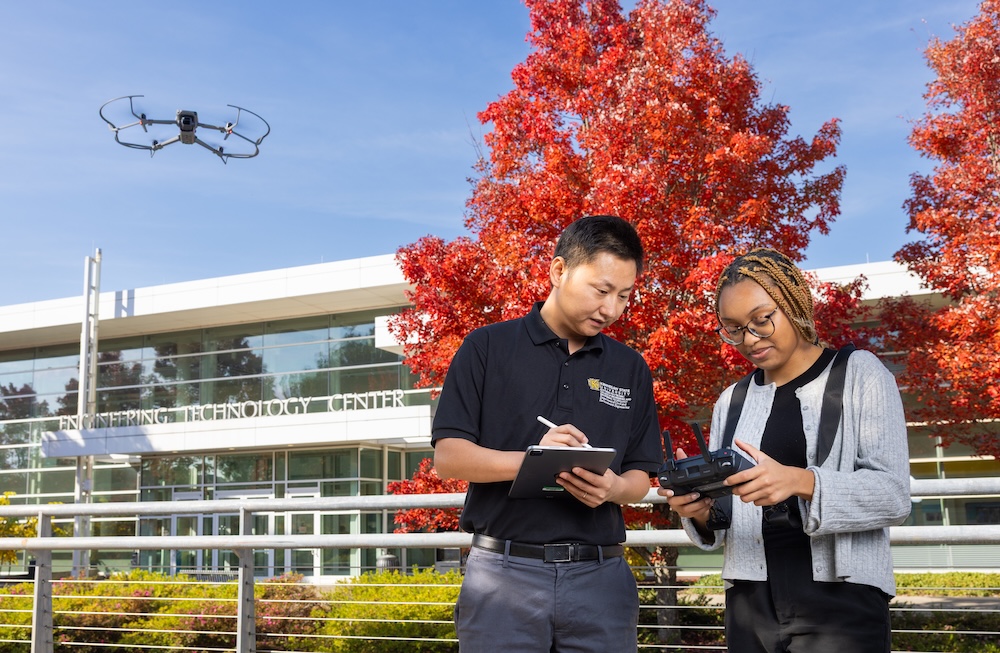

KENNESAW, Ga. | Nov 17, 2025

O’Neal, a junior computer science major from Ludowici, Georgia, is one of dozens of students engaged in Kennesaw State’s Junior & Senior Scholars Program, which pairs undergraduate students with faculty mentors for hands-on research experiences. Together, she and Hu are developing a system that uses drone imagery to automatically detect and categorize building damage after disasters.
“Our goal is to provide a tool that helps first responders know exactly what they’re walking into before they even arrive,” O’Neal said. “By training AI to recognize different levels of structural damage from drone images, we can help emergency teams respond faster and more effectively.”
Hu, an assistant professor of civil engineering in smart infrastructure in the Southern Polytechnic College of Engineering and Engineering Technology, said the project could significantly reduce the time it takes to evaluate damage across large areas.
“Currently, agencies like FEMA send inspectors to examine each building one by one,” Hu said. “That process can take weeks. Using drones equipped with cameras, our system can cover a much larger area in a fraction of the time, automatically identifying whether a structure has major, minor, or no damage.”
The project builds upon O’Neal’s earlier research with Hu, which focused on detecting defects in bridges. That experience taught her the challenges of training AI models to interpret complex visual data.
“When we first started, we focused on bridge crack detection,” she said. “Now we’re expanding that idea to buildings, teaching the AI to identify all kinds of post-disaster damage.”
Creating a reliable dataset has been one of the team’s biggest challenges. O’Neal and other students in the Cyber-Physical Infrastructure Resilience Lab are manually labeling thousands of drone images to teach the model how to distinguish between varying degrees of destruction.
Once their AI system is fully trained, the team plans to collaborate with local emergency management departments to test its real-world effectiveness. The technology could be used not only for hurricanes, but also for tornadoes, earthquakes, and other disasters.
Beyond the potential impact on emergency response, the project has transformed O’Neal’s own academic path.
“When I first came to KSU, I thought I would just graduate and get a job,” she said. “But through research, I discovered something I really love. It’s made me want to pursue a master’s degree or even a Ph.D.”
Her dedication has already taken her across the country to present her findings at conferences such as the National Conference on Undergraduate Research (NCUR) and the Institute for Electrical and Electronics Engineers (IEEE) Southeast Conference.
“It’s been an amazing experience,” she said. “Presenting helped me grow more confident and connected with other researchers who are just as passionate about using technology to make a difference.”
As their research progresses, both Hu and O’Neal are motivated by a shared goal of improving public safety.
“Disasters are happening more frequently,” Hu said. “If we can provide a tool that helps save time and lives, then it’s worth every bit of effort.”
– Story by Raynard Churchwell
Photos by Matt Yung
A leader in innovative teaching and learning, Kennesaw State University offers undergraduate, graduate, and doctoral degrees to its more than 51,000 students. Kennesaw State is a member of the University System of Georgia with 11 academic colleges. The university's vibrant campus culture, diverse population, strong global ties, and entrepreneurial spirit draw students from throughout the country and the world. Kennesaw State is a Carnegie-designated doctoral research institution (R2), placing it among an elite group of only 8 percent of U.S. colleges and universities with an R1 or R2 status. For more information, visit kennesaw.edu.